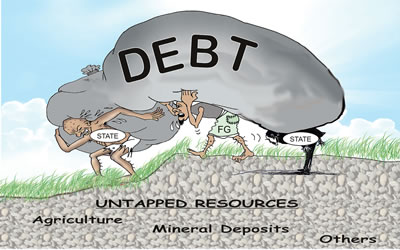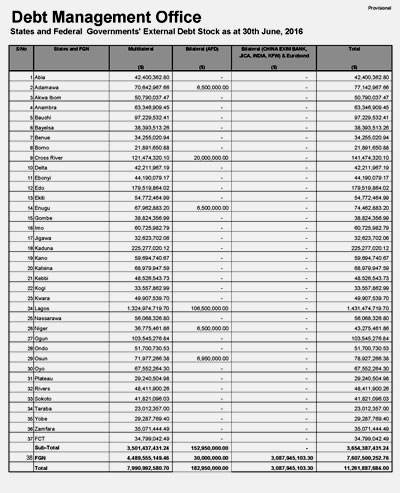In this report, Sanya Adejokun takes a look at the burden of debts and poverty across the states of the federation, occasioned by the poverty of ideas, inability to explore opportunities and failure to save for raining days, among others, concluding that states, and, indeed, the Federal Government are staring bankruptcy in the face.
EXCEPT that it has not happened yet in any jurisdiction, most states in Nigeria would have qualified to be declared insolvent! As far back as 2012, the Nigerian Senate having observed the worrisome economic situation in some of the states of the federation had directed its committee on Finance and Appropriation to suggest remedial measures that would help to avoid a total collapse of the economies of state governments that were unable to meet their financial obligations, especially to their workers. In addition to this, other statutory obligations that would have brought democratic and economic succour to their people had been neglected as a result of lack of fund.
In a motion, the senators had also directed the Federal Ministry of Finance to consider the establishment of a State Economic Stabilisation Fund (SESF) in line with provision of Section 164 Subsection 1 of the 1999 Constitution as amended, which states: “The Federation may make grants to a state to supplement the revenue of that state in such sum and subject to such terms and conditions as may be prescribed by the National Assembly.”
Members of the august Senate assembly went further by imploring the Ministry of Trade and Investment to work with states of the federation to develop and implement policies and programmes on how to promote and generate economic growth and employment not just in the affected states. This was in addition to advising the Federal Government to expeditiously review the Revenue Allocation Formula in favour of states and local government councils in the spirit of “true federalism.”
However, it would appear that not much was done about the proposal by the Senate as the condition of the states had worsened since then. In March this year, President Muhammadu Buhari publicly declared that 27 of 36 states had almost gone under. The huge burden of debt was so suffocating that civil servants in the affected states had been left unpaid for months, prompting the idea of bailout to these states. Although he did not say it, even the Federal Government has been borrowing to pay salaries, as monthly allocations have been barely enough to cover its total cost of meeting that obligation. Such is the dire state of the Nigerian economy that not even any tier of government is spared its deteriorating effect.
A regime of insolvency…
But when does an organisation become or is certified insolvent? According to global business practice, a business organisation will be considered to be insolvent if it is unable to meet its debt obligations, or in other words, pay its debts. Basically, this means that the company has gone bust.
Two tests are used to determine whether a company has become insolvent: The cash-flow test and the balance sheet test. The cash-flow test is predicated on the questions: are the company’s current debts, or future debts unable to be paid as they fall due? While the balance sheet test is predicated on whether the value of the company’s assets is less than the amount of its liabilities, taking into account the present uncertain circumstances and future liabilities.
Thus, how many of the states, if subjected to these tests, would pass? The reality check is that not even any of the states can categorically determine their asset worth with most of the God-given natural resources lying fallow or buried in the ground waiting to be tapped. In essence, the nation has continued to eat gleefully and thoughtlessly into its future.
Over the years, Nigeria has become completely reliant on crude oil as the backbone of its economy, relying heavily on the vagaries of the volatile global oil market to plan only for the present and hardly thinking or making provision for the future. Between 2009 and July 2014, global crude oil prices averaged $100 per barrel and the country produced around 2.1 million barrels per day. During this period and even since around 2002, the economy grew annually by seven per cent. Incidentally, economists argue that the growth was only propelled by crude oil sale. There was not much of agriculture, manufacturing or tourism. But the unfortunate aspect, according to Dr Abiodun Folawewo of the Faculty of Economics, University of Ibadan, is the failure of the government, both federal and states, to re-invest the crude oil earnings in the agricultural and manufacturing sectors and multiply its revenue portfolios and also generate employment in the nation.
Former External Affairs minister, Professor Bolaji Akinyemi, in a lecture he delivered recently, blamed the failure of the government to save during period of plenty on the constitution. According to him, the 1999 Constitution ordered that every month, Federation Account must be withdrawn to zero. As a result of the absence of fiscal federalism, most states depend on monthly allocation from federation account.
In that 2012 motion moved by Senator Olubunmi Adetunmbi (Ekiti North), it was observed that states were facing looming danger of insolvency as a result of huge wage bill associated with the implementation of minimum wage and other recurrent responsibilities. “Most states have become social employers of labour with unsustainably high work force that does not reflect in improved service delivery to the people.
“In most states, the private sector is weak and unable to generate economic growth and jobs that are required, thereby making the states and local government councils the largest employer of labour with attendant fiscal imbalance.”
During that year, available data reveal that Lagos State generated N268.2 billion internally, Rivers State: N82.1 billion, Delta N40.8 billion, Ogun N 34.5 billion, Edo State N19.1 billion, Enugu N18 billion, Oyo, N15.6 billion, Akwa Ibom N14.7 billion and Anambra N14.7 billion.
On the other hand, the internally generated revenues of 15 states were far below 10 per cent of their federation account allocation. These include Yobe with an IGR of N2.2b, Zamfara with an IGR of N2.7bn, Ekiti with N3.2bn, Borno with N3.5bn, and Kebbi with N3.5b. Taraba generated N4.1bn, Nasarawa had N4.4bn, Adamawa made N4.4bn, Gombe had N4.7bn, Bauchi had N5.3bn, Imo had N5.4bn, Katsina had N5.7bn, Niger had N5.9bn while Sokoto generated N6.2bn.
Despite this poor record, according to a 2015 report, Nigeria loses about N50 trillion annually, as a result of untapped resources. Although several states are already tapping into agriculture,, which is still largely at subsistence level, there are other natural resources capable of turning the aim of diversifying the economy into reality, if properly explored, analysts have said.
Penury in the midst of plenty: Nigeria’s untapped goldmine
Already, a total of 37 minerals have been identified to be available in commercial quantities across several states. For many years, there has been talk of generating electricity from coal, which is available in Enugu, Kogi as well as a few other states. There is an untapped lignite deposits in several locations in the country, with over 50 million tonnes of these deposits said to be in Orlu in Imo State through Urnuezeala, Umuahia, Nnewi and Oba in a 20 to 40km-wide belt across the Niger, to Ogwashi, Asaba, Mgbiigliba and Adiase-Uti in Delta State.
Following from this, the country can explore coal (lignites, sub-bituminous coal and bituminous coal).
Columbite
Columbite is found in Plateau, Kano, Kaduna, Bauchi, Kogi and Nasarawa states. Columbite is a black mineral group, an ore of niobium. It has a sub-metallic luster and a high density, a niobate of iron and manganese. Columbite ore is used as an alloy of steel to form weldable high speed steel for radio transmitting valves and heat sensitive detective devices.
Columbite is a substitute for tantalum, which is often used in the electronics and telecommunications industry, making columbite a valuable resource in these industries.
Limestone
Borno, Sokoto, Cross River and Benue are a few of the states limestone can be located in Nigeria. The mineral resource is already being tapped into in Ogun and Kogi states. Limestone is formed either by direct crystallisation from seawater or the accumulation of shell fragments. The average specific gravity of Nigerian limestone varies from 2.70 to 2.86. Limestone is a viable market for the Nigerian government to explore, as it is used for a wide range of purpose by industries. For instance, it can be used in building sculptures and monuments. It can also be used to make paint, tooth paste, detergents, soaps, pharmaceuticals, cosmetics, ceramics, asbestos making, industrial adhesives, paper conversion, livestock concentrate, chemical fillers (rubber and plastic products) and steel and iron refinery.
Tin ore can be found in Jos, Plateau State. In this state, agriculture has remained yet another untapped potential, as it is one of the states blessed with the land and other weather favourable to agriculture in the country.
But Plateau is not the only state that has remained perpetually in bondage of economic woes because it could not reach out to explore some of the opportunities afforded them by nature. Arable land ( percentage of land area) in Nigeria was last measured at 39.53 million kilometres in 2011, according to the World Bank. The arable land includes land defined by the Food and Agriculture Organisation (FAO), as land under temporary crops (double-cropped areas are counted once), temporary meadows for mowing or for pasture, land under market or kitchen gardens, and land temporarily fallow. Land abandoned as a result of shifting cultivation is also excluded.
Squandering in the name of Security Votes
Unconfirmed but reliable sources disclosed that despite the paucity of funds, most state governments earn huge amount of money in the name of security votes from their treasuries. Security votes are normally not appropriated and unaccounted for. Approximately, these governors earn a combined N210 billion as security votes per year with many deducting as high as N500 million every month.
A former deputy speaker in one of the poorest South-West states told newsmen recently that what his governor demanded as soon as allocations arrived from Abuja “is his N500 million monthly security vote. From what we have, immediately money arrived from Abuja, the governor would immediately call those in charge and demand and gets his N500 million before other issues are attended to. That is a firsthand charge. Can you imagine this kind of impunity in this age?
“Our governor does not joke with his security votes and so are his counterparts across the country,” he disclosed, noting that “security vote is un-appropriated, unaudited and unaccounted for.”
He argued that President Buhari should tell Nigerians how the nation’s presidents and governors plunder scarce resources in the name of security votes and demanded that the president do something radical to address the issue, if he was truly desirous of fighting corruption.
Bailout Funds
By the time Buhari became president, most states were no longer able to pay salaries, leading to the Central Bank of Nigeria (CBN) providing a bail out for them. However, investigations by security agencies revealed that the funds were mostly diverted for other purposes, thereby defeating the purpose of the government’s effort to provide succour to the workers.
While many of them who did not owe salaries lied that they did, others failed to apply the amount received from the Federal Government to settle their indebtedness to their workers, leaving them enmeshed in huge arrears of salaries to the staff despite collecting the bailout cash.
Imo State, which collected the sum of N26,806,430.000.00 from the CBN, reportedly paid the amount into two commercial banks and transferred part of the money into uses not related to workers’ salaries. A report by Independent Corrupt Practices and other Related Offences Commission (ICPC) noted that N2 billion was lodged into a Government House Account; N2 billion paid into Imo State Project Account, while another N2 billion was lodged in a micro-finance bank and a ‘management fee’ of N21 million paid into an unspecified account out of the bailout fund received by the state.
Similarly incidents reportedly happened in Cross River, Katsina, Gombe, Nasarawa and others.
For instance, Osun State governor, Mr Rauf Aregbesola, reportedly received N34.988.990.000.00 as bailout fund and disbursed N18.677.224.582.20, leaving a balance of N16.311,765.418 billion as of November. Governor Olusegun Mimiko of Ondo State, according to the report, received N9.443.059.226.92 as bailout fund and disbursed N7.905.484.176.60 with a balance of N1,537.575.050.32. The State reportedly owed one-month salary and several months arrears of gratuity/pension as of 30th September, 2015. Oyo State was granted N26,606,944,831.03 as bailout fund and disbursed N25,495,292,422.63 with a balance of N11.652.408.40. Delta State has a total debt value accrued from staff salaries and emoluments of N36,417,217,601.53. The state was granted N10,936,799,299.36 as bailout fund and disbursed N8,129,888,279.86, with a balance of N2,806,9I1,019.50. However, the state claimed not to owe salaries as of 24th November, 2015. Kebbi State received N7.080.000.000.00 as bailout fund and disbursed N2,617,152,577.20 with a balance of N4,463,975,420.27. The state claimed to have cleared all outstanding arrears on salaries as of September, 2015.
Overall, economists observed that endemic corruption and lack of focus are the main reasons that states are not doing well economically. While politicians make sweet promises during electioneering, most of them are really bereft of seasoned ideas on how to improve the economies of their states. The attraction for most of them is monthly allocation from the sale of sweet crude from the Niger Delta. They argued that until Nigeria learns to tread the path of fiscal federalism, things may not improve soon.







